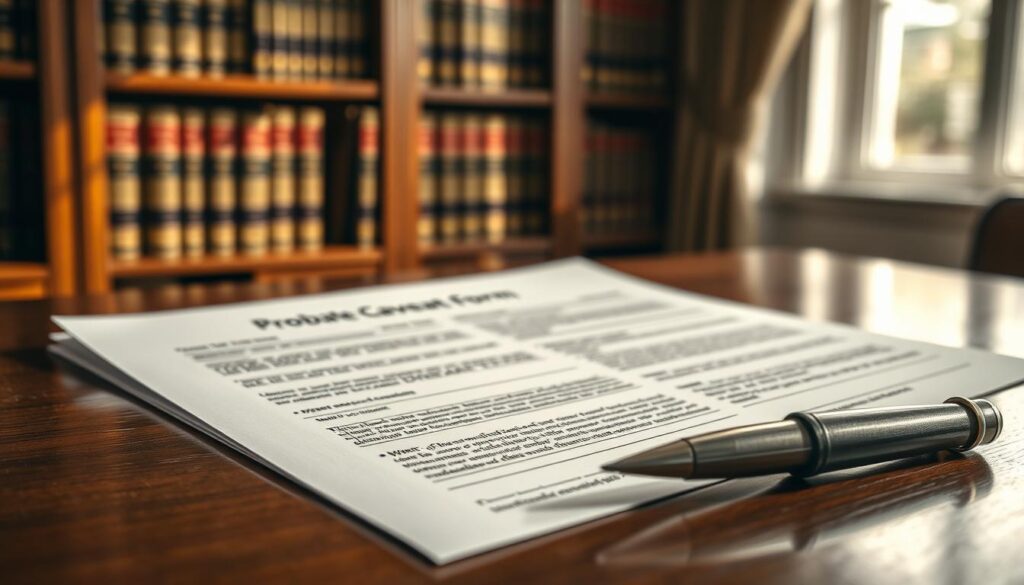When a loved one passes away, dealing with their estate can be a complex and emotional task. In the UK, it’s not uncommon for disputes to arise during the probate process, potentially leading to a caveat being entered. Did you know that a caveat can effectively halt the probate process until the dispute is resolved?
A caveat is a legal notice that prevents the grant of probate. If someone challenges your probate application, they can enter a caveat, causing delays and complications. We will explore what this means and how to resolve such disputes, drawing on insights from our previous discussions on handling tricky probate problems.
Key Takeaways
- A caveat is a legal notice that prevents the grant of probate.
- Disputes during probate can lead to a caveat being entered.
- Resolving caveat disputes is crucial to progressing the probate process.
- Understanding the role of a caveator and their interests is vital.
- Legal action may be necessary to resolve caveat-related disputes.
Understanding What a Caveat Is
A caveat, in the UK probate process, serves as a legal notice that can prevent the grant of probate, thereby affecting the execution of a will. Essentially, it is a warning to the probate registry not to grant probate without notifying the person who has entered the caveat.
Definition of a Caveat
A caveat is a legal mechanism used to pause the probate process. It is typically filed by someone who disputes the validity of the will or has concerns about the executor. For instance, if a family member believes that the deceased was under undue influence when making the will, they might file a caveat to prevent probate from being granted until their concerns are addressed.
The implications of a caveat are significant. It effectively halts the probate process, giving the caveator time to investigate their concerns. This can be a crucial step in ensuring that the deceased’s estate is handled according to their true wishes.
Purpose of Filing a Caveat
The primary purpose of filing a caveat is to prevent the grant of probate without the caveator being notified. This is particularly important in cases where there are disputes over the will or concerns about the testator’s capacity. By filing a caveat, individuals can ensure that they are given the opportunity to contest the will or raise their concerns before probate is granted.
- To dispute the validity of the will
- To raise concerns about the executor
- To investigate potential undue influence or coercion
For more detailed information on the caveat process and its implications, you can visit MPEstate Planning, which provides comprehensive guidance on navigating these complex legal issues.
The Process of Probating a Will in the UK
Understanding the probate process is essential for those dealing with the estate of a loved one who has passed away, as it involves several key steps and responsibilities. We will guide you through the process, highlighting the crucial role of the executor and the potential impact of a caveat.
Key Steps in the Probate Process
The probate process involves several important steps. First, we must determine if a grant of probate is required. This involves assessing whether the deceased’s estate is subject to probate and if the will needs to be proven in court.
Once it’s established that probate is necessary, we proceed to obtain a grant of probate. This legal document gives the executor the authority to manage the estate according to the deceased’s wishes as outlined in their will.
- Inventorying the estate: We gather information about all assets, debts, and liabilities.
- Valuing the estate: We determine the total value of the estate’s assets.
- Paying debts and taxes: We settle any outstanding debts and taxes owed by the estate.
- Distributing assets: We distribute the remaining assets according to the will.
Role of the Executor
The executor plays a vital role in the probate process. They are responsible for ensuring that the deceased’s wishes are carried out as stated in the will. For more detailed information on the executor’s duties, you can visit our guide on executor duties.
The executor’s tasks include:
- Managing the estate’s assets.
- Communicating with beneficiaries and other parties involved.
- Preparing and submitting tax returns.
- Distributing the estate according to the will.
If a caveat is lodged against the estate, the executor must address the concerns raised before proceeding with the probate process. This can involve negotiations or legal action to resolve disputes.
Reasons for a Caveat to Be Filed
When a caveat is lodged against a grant of probate, it is often due to underlying issues that need to be addressed. These issues can range from disputes over the will’s validity to concerns about the testator’s mental capacity at the time of making the will.
Disputes Over the Will
Disputes over the will are a common reason for filing a caveat. These disputes can arise from various factors, including allegations of undue influence or claims that the will does not accurately reflect the deceased’s intentions. For instance, a beneficiary might contest the will if they believe the deceased was coerced into making certain bequests. As stated by a legal expert,
“A caveat is a crucial tool for protecting the interests of those who believe the will is not valid or fair.”
In such cases, filing a caveat can temporarily halt the probate process, allowing for a more thorough examination of the will’s validity. It’s essential to understand that contesting a will can be complex and may involve investigating the circumstances surrounding its creation. For more information on contesting a will after probate, you can visit our detailed guide.
Concerns About the Testator’s Capacity
Concerns about the testator’s mental capacity are another significant reason for filing a caveat. If there are doubts about whether the deceased had the necessary mental capacity to make a valid will, a caveat can be lodged to prevent the grant of probate until these concerns are addressed.
For example, if the testator was suffering from dementia or another condition that could affect their mental capacity, it might be argued that they were not fully aware of their decisions when making the will. 
It’s crucial to address these concerns promptly, as they can significantly impact the distribution of the estate. By filing a caveat, individuals can ensure that the estate is not distributed until there is clarity on the testator’s capacity and the will’s validity.
Legal Implications of a Caveat
The legal implications of a caveat are far-reaching, influencing both the probate process and the parties involved. When a caveat is lodged, it effectively puts a hold on the probate process, preventing the grant of probate or letters of administration from being issued.
Impact on the Probate Process
A caveat can significantly delay the probate process. This is because the caveat acts as a warning to the Probate Registry not to issue a grant of probate without notifying the person who lodged the caveat. As a result, the administration of the deceased’s estate is put on hold until the caveat is resolved.
For instance, if a caveat is filed against a will, the executors named in the will cannot proceed with the administration of the estate until the caveat is removed. This can lead to prolonged delays and increased legal costs. According to The Gazette, understanding the implications of a caveat is crucial for navigating the probate process effectively.

Responsibilities of the Person Filing the Caveat
The person who files a caveat, known as the caveator, has certain responsibilities. They must be prepared to justify their reasons for lodging the caveat if challenged by the executors or beneficiaries of the estate. The caveator is also responsible for ensuring that the caveat is valid and that they have a legitimate interest in the estate.
If the caveator fails to respond to a warning issued by the Probate Registry or does not have a valid reason for lodging the caveat, they may be liable for the costs incurred by the other parties involved in the probate process.
| Aspect | Impact of a Caveat |
|---|---|
| Probate Process | Delays the issuance of a grant of probate or letters of administration |
| Legal Costs | Increases costs due to prolonged legal proceedings |
| Caveator’s Responsibilities | Must justify the caveat and be prepared for potential legal challenges |
Understanding these legal implications is essential for anyone considering filing a caveat or dealing with the consequences of one being filed against an estate. We recommend seeking professional legal advice to navigate these complex issues effectively.
How to File or Remove a Caveat
If you’re facing a situation where a caveat has been lodged against a probate application, knowing how to navigate this legal hurdle is essential. A caveat is a legal notice that effectively stops the probate process until the dispute is resolved.
Filing a Caveat: Step-by-Step Guide
To file a caveat, you must complete the appropriate form and submit it to the Principal Probate Registry or a district probate registry. Here are the steps involved:
- Obtain the relevant form from the UK Government’s website or a probate registry.
- Fill in the form with the required details, including the name of the deceased and the reason for lodging the caveat.
- Submit the completed form to the probate registry.
- Pay the required fee for lodging the caveat.
It’s crucial to ensure that the information provided is accurate and that you have valid reasons for lodging the caveat.
Removing a Caveat: What You Need to Know
Removing a caveat involves a formal process. Here are the key steps:
- A ‘warning’ is issued by the person seeking to remove the caveat, which is then served on the caveator.
- The caveator must then respond by either withdrawing the caveat or issuing a summons to appear in court.
- If the caveator fails to respond, the caveat can be removed.
The process of removing a caveat can be complex and may involve legal proceedings. Seeking legal advice is often beneficial in these situations.

| Process | Steps Involved |
|---|---|
| Filing a Caveat | Obtain form, fill it in, submit to probate registry, pay fee |
| Removing a Caveat | Receive warning, respond by withdrawing or issuing summons, potentially go to court |
Understanding the process of filing or removing a caveat is crucial in navigating probate disputes. Whether you’re lodging a caveat or seeking to remove one, being informed about the legal procedures involved can help you make the right decisions.
Duration of a Caveat
A caveat, once filed, has a specific lifespan that can be extended under certain circumstances. When a caveat is entered, it typically remains in effect for six months from the date of registration. This period allows the person who filed the caveat sufficient time to resolve any disputes or concerns they may have regarding the estate.
Time Limits for Caveats
The initial six-month duration is a standard timeframe, providing a window for the caveator to prepare their case or negotiate with other parties involved in the probate process. It’s essential to note that the caveat’s duration can impact the overall probate timeline, potentially delaying the distribution of the estate.
As stated by a leading probate expert,
“The caveat serves as a protective measure, giving the caveator time to assess their position and decide on the next steps.”
This quote highlights the importance of understanding the duration and implications of a caveat.
Renewal of a Caveat
If necessary, a caveat can be renewed. To renew, the caveator must reapply before the initial caveat expires. The renewal process involves completing a new caveat form, such as the probate caveat form UK, and submitting it to the Principal Probate Registry. It’s crucial to seek the advice of probate caveat solicitors UK to ensure the renewal is handled correctly and in a timely manner.

Renewing a caveat effectively extends the period during which the estate’s probate cannot be finalized, giving the caveator additional time to resolve their concerns. However, it’s worth noting that repeated renewals may lead to further disputes or complications, potentially necessitating legal intervention.
Resolving Caveat Disputes
Resolving caveat disputes is a nuanced process that involves understanding the legal framework and the options available for resolving such disputes. When a caveat is lodged against a will, it can significantly complicate the probate process, leading to potential disputes among beneficiaries and executors.
Mediation Options
Mediation is often considered a preferable first step in resolving caveat disputes due to its less adversarial nature compared to court proceedings. It involves a neutral third-party mediator who facilitates discussions between the disputing parties to help them reach a mutually acceptable agreement.
The benefits of mediation include:
- Cost-effectiveness compared to litigation
- Preservation of family relationships through less confrontational means
- Flexibility in reaching creative solutions that might not be available through court judgments
Going to Court
If mediation fails to resolve the dispute, the next step may involve going to court to challenge the caveat. This process involves presenting the case before a judge who will then decide whether to uphold or remove the caveat.
Key considerations when going to court include:
- Gathering comprehensive evidence to support your case
- Understanding the legal grounds for challenging a caveat
- Preparing for potential counterarguments from the opposing party
To illustrate the process and outcomes of resolving caveat disputes, let’s examine a comparative analysis of mediation versus court proceedings:
| Aspect | Mediation | Court Proceedings |
|---|---|---|
| Cost | Generally lower | Can be high due to legal fees |
| Time | Typically faster | Can be lengthy due to court schedules |
| Nature | Less adversarial | More confrontational |
| Outcome Control | Parties have more control | Outcome decided by judge |

Resolving caveat disputes requires a careful and considered approach, whether through mediation or court proceedings. Understanding the options available and their implications is crucial for navigating these complex situations effectively.
The Role of Legal Professionals
Navigating the complexities of probate caveats often requires the expertise of legal professionals. When a caveat is lodged against a probate application, it can significantly complicate the process, making it essential to understand the role of legal professionals in resolving such disputes.
When to Consult a Solicitor
It’s often advisable to consult a solicitor when dealing with caveat disputes due to their complexity and potential legal implications. A solicitor can provide invaluable guidance on the legal framework surrounding probate caveats, helping you navigate the process more effectively. Here are some scenarios where consulting a solicitor is particularly beneficial:
- When you’re unsure about the validity of the caveat or the grounds on which it’s been lodged.
- If you’re facing opposition from other beneficiaries or parties involved in the probate process.
- When the estate involves complex assets or international elements that require specialized knowledge.
By seeking the advice of a solicitor early on, you can better understand your options and the potential outcomes of your case. As noted by a legal expert,
“Having professional legal advice can make a significant difference in the outcome of a probate caveat dispute.”
Legal Costs Involved
Understanding the legal costs involved in resolving a probate caveat dispute is crucial for managing your expectations and making informed decisions. The costs can vary widely depending on the complexity of the case, the solicitor’s fees, and whether the matter proceeds to court.
Here are some key factors that influence legal costs:
- The complexity of the dispute and the number of parties involved.
- The solicitor’s charging structure, which may be hourly, fixed fee, or a combination of both.
- Whether the case requires specialist expertise, such as in cases involving international assets.
It’s essential to discuss costs with your solicitor at the outset to get a clear understanding of what to expect. We recommend asking about their fee structure and any additional costs that may arise during the process.

In conclusion, legal professionals play a vital role in guiding individuals through the probate caveat process. By understanding when to consult a solicitor and the legal costs involved, you can navigate these complex disputes more effectively.
Alternatives to Filing a Caveat
Alternative dispute resolution methods offer a viable alternative to filing a caveat in probate cases. When disputes arise over a will, it’s not always necessary to resort to filing a caveat. Instead, parties can explore other options that may resolve the issue more efficiently and with less conflict.
Other Options for Disputing a Will
There are several alternatives to filing a caveat that can be considered when disputing a will. These include:
- Mediation: A neutral third-party facilitates a discussion between the disputing parties to reach a mutually acceptable agreement.
- Negotiation: Direct communication between the parties involved to settle the dispute.
- Arbitration: A more formal process where an independent arbitrator makes a binding decision.
These methods can be less adversarial and less costly than the traditional litigation process associated with filing a caveat.
Benefits of Alternative Dispute Resolution
Alternative Dispute Resolution (ADR) methods, such as mediation, offer several benefits, including:
- Reduced Conflict: ADR encourages collaborative problem-solving, reducing the emotional strain on all parties.
- Cost-Effective: Generally, ADR is less expensive than going to court.
- Time-Efficient: ADR processes can be resolved much quicker than court proceedings.
- Confidentiality: ADR processes are typically private, unlike court proceedings which are public.
By considering these alternatives, individuals involved in probate disputes can often find a more suitable and less confrontational way to resolve their issues.
When dealing with will disputes, it’s essential to seek professional advice to determine the best course of action. Consulting with probate caveat solicitors in the UK can provide clarity on whether filing a caveat or pursuing alternative dispute resolution methods is more appropriate for your situation.
Case Studies of Caveats in Probate
Examining real-life scenarios where a probate is stopped by a caveat in the UK provides valuable insights into the complexities of probate disputes. We have observed several cases where the filing of a caveat significantly impacted the probate process, leading to a more nuanced understanding of the legal implications involved.
Notable Examples
One notable case involved a dispute over the validity of a will, where a caveat was filed due to concerns about the testator’s capacity. The caveat effectively halted the probate process, allowing for a thorough investigation into the allegations. For more information on contesting a will, you can visit our page on contesting a trust in the UK.
Lessons Learned
These case studies demonstrate that understanding how to challenge a probate caveat in the UK is crucial for resolving disputes efficiently. They highlight the importance of seeking professional legal advice to navigate the complexities of probate law and the potential benefits of alternative dispute resolution methods.


